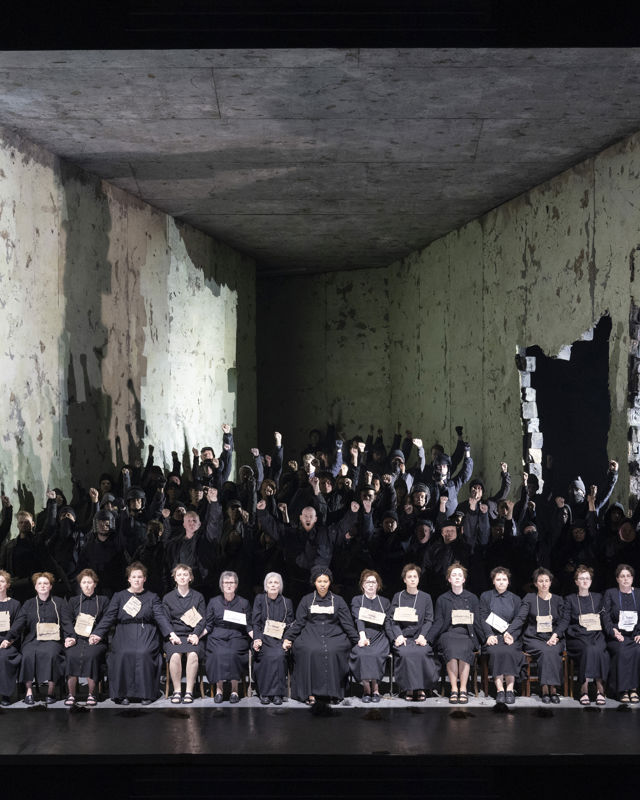Pray for a ticket!
 Foto: © Glyndebourne Productions Ltd. Foto: Richard Hubert Smith
Foto: © Glyndebourne Productions Ltd. Foto: Richard Hubert Smith
Richard Morrison, The Times:
«I have experienced many powerful nights at the opera, but I can’t remember any leaving me as emotionally wrenched as what Barrie Kosky achieves with this Glyndebourne staging of Poulenc’s 1957 masterpiece. With superb singing and orchestral playing evident throughout, you should beg, buy or perhaps (for this story of religious martyrdom) pray for a ticket.
Some had wondered whether the Australian director might be too ebullient a personality to stage effectively an opera that culminates in the execution of 16 nuns. And it’s true that as the piece progresses his masterly theatricality grows ever more startling. Katrin Lea Tag’s set — at first seemingly consisting of dull, high, streaky grey walls — sprouts an entire garden of flowers, then weeps blood, then is brought crashing down by a baying mob and finally, well, let’s not reveal Kosky’s final shocking coup, except to say that with one sustained visual allusion he widens this French Revolution-era story to embrace the Holocaust and all persecutions through history.
Even before that, however, the action has a stark, highly physical fervour, interspersed with bold moments when characters freeze for many seconds while the music is paused and their anguish highlighted by old-fashioned spotlight. William Blake’s line “to see a world in a grain of sand” comes to mind. This is a convent where silence and conformity is the rule, but it’s also a turmoil of individuals facing danger and death with varying degrees of bravery and certainty.»
Nicholas Kenyon, The Telegraph
«There is nothing in opera, absolutely nothing, quite like Francis Poulenc’s extraordinary piece about the nuns of Compiègne, caught up in the terror of the French Revolution and finally meeting their deaths on the scaffold. When it first appeared in 1957, its backward-looking music, shot through with the models the composer acknowledged – from Monteverdi through Verdi to Musorgsky – may have seemed old-fashioned in the age of Boulez and Messiaen. Increasingly, though, the elemental power of its storytelling and its vividly traditional musical language have won favour with audiences ready to be stunned by the directness of its emotional appeal.
It is arguably a big ask of Glyndebourne’s pleasure-seeking crowd to be subjected to the repeated sounds of the guillotine after their evening’s picnics. But in this wrenchingly powerful new staging by Barrie Kosky, magnificently conducted by Robin Ticciati, the piece hits home with renewed strength.
This is a superlative realisation of a great opera.
Daily Telegraph
Within the bare, pock-marked convent walls of Katrin Lea Tag’s set, down which blackness drips as danger approaches, the nuns – shorn of their traditional garb and dressed in simple black – are a close-knit, emotionally supportive community. They cheerfully go about their daily tasks, but the fear of death is ever-present, shockingly represented by the final torments of the Prioress (a harrowing Katarina Dalayman) as she rails against her lifetime’s faith.
Kosky puts the nuns in dense groups or formal lines, but two stand out: the bright-eyed Constance (Florie Valiquette) and the intense and nervous Blanche (Sally Matthews) who has come to the convent for refuge from the terror on the streets. The new Prioress (Golda Schutz) arrives with initial warm optimism but commits the community to martyrdom and shares the fate of all – except for Mother Marie (Karen Cargill), who escapes to tell the sorry tale.
The searing intensity of all these performances is beyond praise: as Blanche, Sally Matthews (who this season has replaced the originally planned Danielle de Niese) has the role of a lifetime and delivers it with suppressed passion. Poulenc wrote his score in short, separate scenes, and Kosky is the absolute master of using silences between these scenes to focus the action: Blanche’s silent weeping, the cry of the crowd as it attacks the convent, breaking through the wall. Sometimes, there is no more than a light on one person, concentrating fear into a moment: this is a staging in which every single gesture tells.
Men play a very subsidiary role in this story: Blanche’s father (Paul Gay) and brother (Valentin Thill) do their best to rescue her, but her loyalty remains with the nuns as they reach the denouement, here staged with chilling echoes of the then-recent extermination of the camps. The evocatively colourful orchestration and the static beauty of the nuns’ Latin hymns sit awkwardly alongside the brutality of the story, but under Ticciati’s expert hands they never lapse into sentimentality. This is a superlative realisation of a great opera.»
Les anmeldelsen i The Guardian Les anmeldelsen i Evening Standard Mari Eriksmoen / Foto: Erik Berg
Mari Eriksmoen / Foto: Erik Berg
søstrene